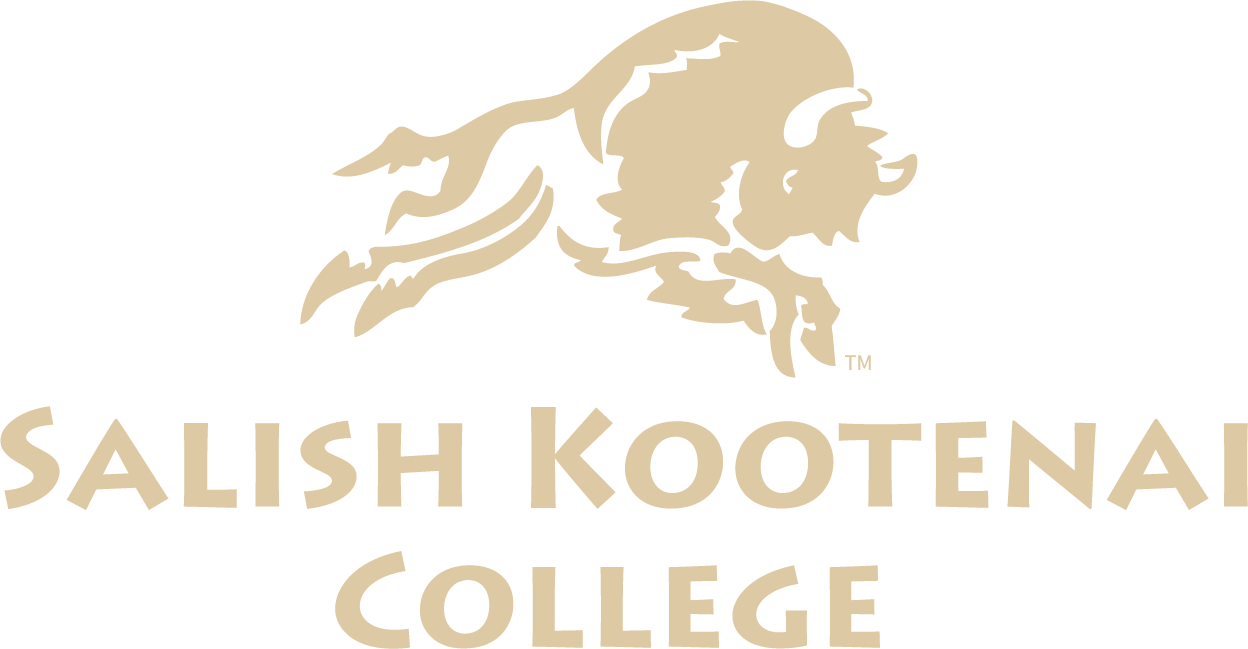The mission of the Bachelor of Social Work Program is to prepare students for generalist social work practice with diverse populations and to cultivate community leaders who will implement humane social policies, services, and programs that restore social and economic justice for at-risk children and their families. The cornerstone of the program is commitment to personal and community well-being and the cultural integrity of Native American communities.
Accreditation: The SKC Bachelor of Social Work Program is accredited by the Council on Social Work Education, a specialized accrediting body recognized by the Council on Post-Secondary Accreditation.
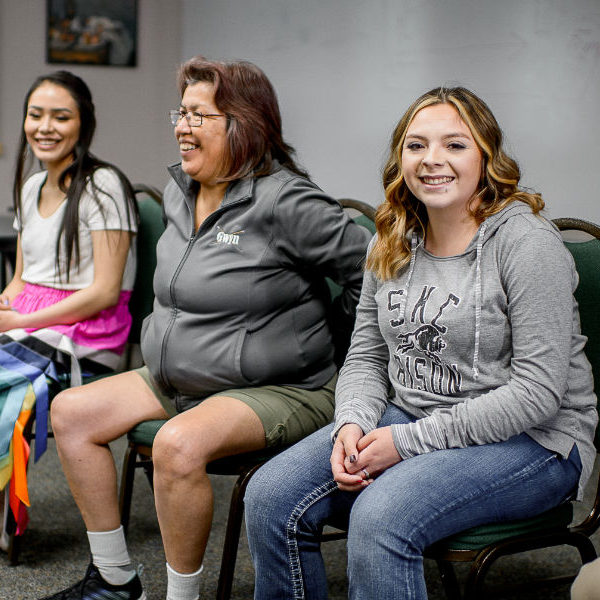
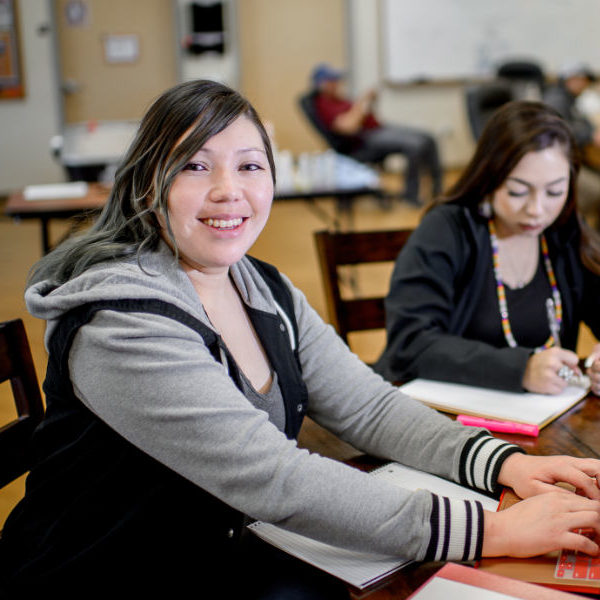
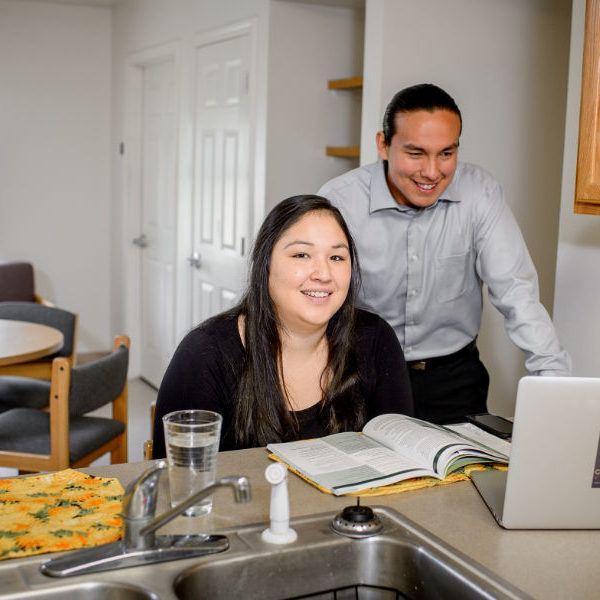
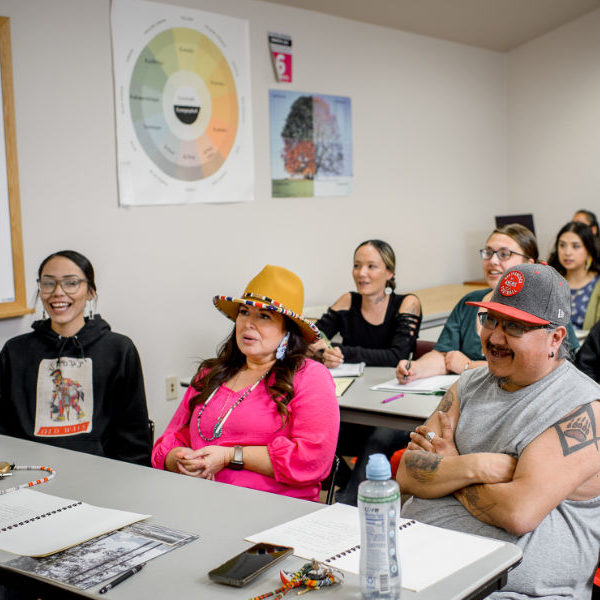
Programs in this Department
AA Chemical Dependency Counseling
The two-year Chemical Dependency Counseling Program is designed to prepare students for employment as chemical dependency counselors both on and off the Flathead Indian Reservation. The CDAR (Chemical Dependency/Addictions Recovery) courses assist students in developing competencies in the professional, legal, ethical, and cultural aspects of chemical dependency counseling, including clinical evaluation, treatment planning, documentation, referral, service coordination, counseling, client and community education, and professional ethical responsibility.
Substance abuse and behavioral disorder counselors advise people who suffer from alcoholism, drug addiction, eating disorders, or other behavioral problems. They provide treatment and support to help the client recover from addiction or modify problem behaviors. Substance abuse and behavioral disorder counselors work in a wide variety of settings, such as mental health centers, community health centers, prisons, and private practice.
Upon the completion of the A.A. in Chemical Dependency Counseling degree, the graduates are expected to:
- Demonstrate basic knowledge about substance abuse disorders.
- Demonstrate an understanding of treatment models in behavior change and recovery.
- Demonstrate the ability to apply intervention and recovery knowledge to practice.
- Demonstrate professional readiness and an understanding of issues related to self-awareness, diversity, ethics, and continuing education.
All applicants must be admitted to SKC and meet the admission criteria listed below prior to applying to the Social Work Program.
- Minimum cumulative GPA of 2.5.
- Well-developed writing and language skills as demonstrated through the Junior Writing Portfolio.
Program Contact(s)
KC Murphy
kassandra_murphy@skc.edu
406-275-4888
Bachelor of Social Work
The mission of the Bachelor of Social Work Program is to prepare students for generalist social work practice with diverse populations and to cultivate community leaders who will implement humane social policies, services, and programs that restore social and economic justice for at-risk children and their families. The cornerstone of the program is commitment to personal and community well-being and the cultural integrity of Native American communities.
Social workers assist people to solve and cope with problems in their everyday lives. One group of social workers, clinical social workers, also diagnose and treat mental, behavioral, and emotional issues. Social workers are employed in a variety of settings, including mental health clinics, schools, child welfare and human service agencies, hospitals, and private practices.
Graduates of the Bachelor of Social Work program are expected to:
- Identify as a professional social worker and conduct oneself accordingly.
- Apply social work ethical principles to guide professional practice.
- Apply critical thinking to inform and communicate professional judgments.
- Engage diversity and difference in practice.
- Advance human rights and social and economic justice.
- Engage in research-informed practice and practice- informed research.
- Apply knowledge of human behavior and the social environment.
- Engage in policy practice to advance social and economic well-being and to deliver effective social work services.
- Respond to contexts that shape practice.
- Engage, assess, intervene, and evaluate with individuals, families, groups, organizations, and communities.
All applicants must be admitted to SKC and meet the admission criteria listed below prior to applying to the Social Work Program.
- Minimum cumulative GPA of 2.5.
- Well-developed writing and language skills as demonstrated through the Junior Writing Portfolio.
Program Contact(s)
KC Murphy
kassandra_murphy@skc.edu
406-275-4888
Social Work Assessment
The BSW faculty and staff have been involved in ongoing efforts improve the program and its assessment and to enhance student performance based on the assessment results. The program contracted with an Accreditation Specialist and an Assessment Coordinator in 2006 to assist faculty with developing and/or refining course assignments to better align with course objectives, designing appropriate assessment instruments, articulating data collection procedures, and analyzing data. Group workshops and trainings, as well as individual consultations continue to be provided to faculty.
The BSW Program has collected and analyzed data for six years in order to monitor the quality and progress of the program as well as assess student performance. Each year, the Social Work department personnel have been deliberate in their consideration and use of the program assessment results to improve the quality of the program and its outcomes. This attention to the assessment outcomes continues to pay dividends in program improvement.
Although one must consider the caveats in regards to the strength of the evidence given our small student population and the relatively large variance in scores both within and across years, the assessment evidence suggests continuous improvement in student achievement. More precise comparison with previous years’ data using the overall benchmark attainment is difficult, given the many changes that have occurred in the program’s assessment over the last six years, including annual revisions of keystone assignments, scoring rubrics, and Internship Learning Agreement evaluation tool. The 2008 EPAS and focus on core competencies and practice behaviors have resulted in yet another significant revision of the BSW program and assessment plan in 2010. All syllabi, assignments, and assessment tools were changed to align with the new standards. Moreover, the small sample sizes for the SKC BSW Program assessments mean that individual scores easily skew the results. This situation can make it difficult to discern trends over the years when one considers assessment results type by type. In spite of these challenges, the BSW personnel and Assessment Specialist will continue to collaborate to maintain a high-quality assessment plan that aligns with the new guidelines and provides information-rich data that the program can use fruitfully.
All accredited social work programs are required to measure and report student learning outcomes. Students are assessed on their mastery of the competencies that comprise the accreditation standards of the CSWE. These competencies are dimensions of social work practice that all social workers are expected to master during their professional training. The following pages will provide information about the data indicators used in our assessment and the findings by academic year.
Data Indicators
2006-2010
In 2006-2010, the assessment plan was designed based on program objectives, learning outcomes, and previous CSWE EPAS. During those years, the data was collected from the following sources: Area of Concentration Achievement Test (ACAT) Internship Learning Agreement Outcomes Evaluation (ILAOE) Rubric scores and narrative feedback from keystone assignments, including the Cultural Competency Assignment which was a capstone project completed over three quarters during the students’ senior year that addressed all of the program objectives Assessment Specialist Regina Sievert, an external evaluator for the program, thoroughly analyzed the data and submitted an objective assessment report annually by August. In addition to data analysis, she also provided recommendations for improvement. Based on the assessment report mentioned above, the Department Chair compiled an annual comprehensive program assessment report, titled Learning Outcomes Assessment Report (LOAP), for submission to the SKC’s Office of Institutional Research. The reports thoroughly discuss the BSW program assessment, evaluation, and improvement efforts each year.
2010-2011
In 2010-2011, the program continued the data collection efforts based on the new assessment plan. With the new accreditation cycle, the program had to completely revise the previous assessment plan to align with the 2008 EPAS and core competencies established by CSWE. As a result, the following changes were made in the assessment plan in 2010-2011: Faculty members thoroughly reviewed and revised each assignment and the accompanying rubrics to address and align with 2008 EPAS. Outdated keystone assignments were removed and new ones were designed. The Internship Learning Agreement Evaluation tool was completely re-designed to address and align with 2008 EPAS. Due to the challenges associated with data entry and analysis based on keystone rubric scores, the Practice Behavior Competency Evaluation Instrument on Survey Monkey was designed and implemented. Consequently, with an exception of ACAT results, the assessment data between 2006-2010 and 2010-2012 are not compatible or suitable for comparison. The revised and improved assessment plan developed by the Social Work faculty is designed to strategically measure student competencies based on 2008 EPAS standards developed by CSWE. The data are collected from the following sources: the Area of Concentration Achievement Test (ACAT) completed by students; the Internship Learning Agreement Evaluation (ILAE) completed by the Internship Site Supervisors; and the Practice Behavior Competency Evaluation Instrument completed by instructors.
Area of Concentration Achievement Test (ACAT)
In 2006-2010, the assessment plan was designed based on program objectives, learning outcomes, and previous CSWE EPAS. During those years, the data was collected from the following sources: Area of Concentration Achievement Test (ACAT) Internship Learning Agreement Outcomes Evaluation (ILAOE) Rubric scores and narrative feedback from keystone assignments, including the Cultural Competency Assignment which was a capstone project completed over three quarters during the students’ senior year that addressed all of the program objectives Assessment Specialist Regina Sievert, an external evaluator for the program, thoroughly analyzed the data and submitted an objective assessment report annually by August. In addition to data analysis, she also provided recommendations for improvement. Based on the assessment report mentioned above, the Department Chair compiled an annual comprehensive program assessment report, titled Learning Outcomes Assessment Report (LOAP), for submission to the SKC’s Office of Institutional Research. The reports thoroughly discuss the BSW program assessment, evaluation, and improvement efforts each year.
Internship Learning Agreement Evaluation (ILAE)
The Internship Learning Agreement (ILAE), a contract collaboratively developed by the student and field supervisor on a quarterly basis to guide the student’s internship experience, was fully implemented in the 2010-2011 academic year internships. The ILAE is used in planning and assessing student performance in each of the three-quarters of the Internship field experience. The ILAE consists of various assignments, customized for each individual, that the student completes during their three-quarters of internship. Students negotiate the Learning Agreement assignments collaboratively with their field supervisor and the field education director to fit their field placement and to promote their personal and professional growth. The ILAE addresses all forty-two practice behaviors that operationalize the CSWE core competencies. At regular intervals throughout the quarter, students meet with their field supervisor and the field director to reflect on and receive formative feedback on their progress. The Internship Site Supervisor completes the ILA Evaluation at the end of each quarter, providing a grade and a number that is used for the program assessment. In 2006-2011, the ILA Evaluations were completed in hard copy and the data was then entered into the Survey Monkey. In 2011-2012, the Site Supervisors will complete and submit the evaluations electronically. The benchmark for success set by the SKC BSW Program is a minimum of 75% of students attaining an average score of at least 7 (70%) or higher in all practice behaviors. An assessment score at or above this benchmark is considered by the program to represent mastery of that particular competency.
Practice Behavior Competency Evaluation Instrument
In 2010-2011, SKC BSW Program developed and piloted the Practice Behavior Competency Evaluation instrument on Survey Monkey. This instrument replaces the previous system of collecting data from rubric scores and narrative feedback from keystone assignments, although the instructor’s assessment of students’ level of competency in each practice behavior is still based on those assignments. The direct data entry by faculty significantly reduces the possibility of subjective interpretation of the level of students’ skills and knowledge in specific areas during the data entry process by the Assessment Coordinator. Each keystone assignment rubric is aligned with specific practice behaviors addressed in the course. At the end of every quarter, faculty members enter their evaluation of the level of each student’s competency in those specific practice behaviors in the Practice Behavior Competency Evaluation instrument on Survey Monkey based on their rubrics. The tool measures students’ competency in each practice behavior on a 10-point scale, with 1 indicating lack of competency and 10 indicating the level of competency expected of a professional entering the field. The benchmark for success set by the SKC BSW is a minimum of 75% of students attaining an average score of 7 (70%) or higher in all practice behaviors. An assessment score at or above this benchmark is considered by the program to represent mastery of that particular competency.
Helpful Links
- Social Work License Map
- Council on Social Work Education
- National Association of Social Workers
- National Association of Social Workers
- US Bureau of Labor Statistics Occupational Outlook Handbook
- American Indigenous Research Association
- Careers
Additional Funding
This website is funded in part under a contract (#20043STIP0002) with the Montana Department of Public Health and Human Services. The statements herein do not necessarily reflect the opinion of the department.
2010-2011 BSW Results & Summary
2011-2012 BSW Results & Summary
2013-2014 BSW Results & Summary
2014-2015 BSW Results & Summary
2015-2016 BSW Results & Summary
2017-2018 BSW Results & Summary
2018-2019 BSW Results & Summary
2019-2020 BSW Results & Summary
2020-2021 BSW Results & Summary
2022-2023 BSW Results & Summary
Implications
As a result of the assessment data analysis, drastic changes in both explicit and implicit curriculum have been implemented in the past six years. The curriculum content and all courses have undergone significant revisions and improvements based on both quantitative and qualitative data analysis. All syllabi, course objectives, lesson plans, and assignments have been modified to meet the changing mandates from both SKC and CSWE and to provide the best education to our students. New courses have been added and outdated ones removed from the graduation requirements, and the curriculum content has been strengthened in existing courses. The following sections describe the most notable developments in key programmatic areas that took place as a direct result of the program assessment efforts.
Curriculum
The program has responded to assessment results by making the following changes in the course requirements:
- Writing Foundations for Social Work I, II, and III courses were developed and placed in the curriculum in 2006.
- The APA Writing Style (SCWK 306) course was redesigned to better meet the needs of the Social Work program and strengthen students’ critical thinking and communication skills and foundational research knowledge. The curriculum committee approved the course credit increase from 1 to 2 in 2007.
- Computer Literacy was re-added as a required course in 2009 to address students’ apparent deficiencies in computer skills.
- Based on students’ consistently low performance in oral presentation assignments, the Advanced Presentation Skills (SPCH 350) class was added to the BSW course requirements for the 2011-2012 academic year.
In response to data analysis results as well as student, instructor, and Assessment Specialist feedback, the department has taken a serious look at streamlining the connection between the curriculum content and numerous assignments required in SCWK courses. As a result, the following scaffolding efforts have been implemented:
- A stronger link to the concept of evidence-based practice was incorporated into the APA course in 2007. This involved emphasizing increased research literacy and technology use, primarily in reviewing and incorporating peer-reviewed journal articles into research papers.
- The fundamental elements of the CC assignments were evaluated and several specific elements were incorporated into Social Work Practice III and Social Work Research classes in 2008 in order to strengthen the practice and research sections of the assignments. In 2011-2012, the CC II and III will be completely removed from the Internship series and incorporated into the Social Work Research and Social Work Practice III classes respectively. The Internship class will reintroduce a version of its Organizational Description report to help serve as a platform for the Cultural Competency assignments.
- The introductory social science research concepts, vocabulary, and methods are now infused throughout the curriculum.
- The professional presentation skills and PowerPoint instruction has been infused throughout the curriculum.
- The Writing Foundations class series utilizes assignments required in other junior-level social work foundation classes. As a result, students practice writing skills while simultaneously significantly increasing the quality of work in their other classes.
Additional changes in the curriculum that were made in response to assessment data include the following:
-
- In response to the analysis of ACAT scores and the formative feedback from the Assessment Specialist, the curriculum and instruction surrounding diversity issues, communication skills, and cultural competency have been closely examined and relevant content has been added or strengthened in all courses. Additionally, curriculum and instruction related to social work practice and policy and services were scrutinized and improved to close the knowledge gaps.
- In response to consistently low research keystone scores, the research course series was restructured in 2010 to teach basic research knowledge and skills rather than to conduct a research study. The emphasis is on designing a culturally competent, evidence based intervention and assessment plan based on students’ internship placements.
- In order to address low student performance due to often unavoidable absenteeism during family emergencies and culturally related activities, most of the SCWK introductory, foundation, and support courses are now offered online on Moodle, an online course delivery platform currently utilized by SKC. The classes are delivered either as a fully online addition to the on campus section, as a hybrid course, or as a supplementary resource to an on-campus class.
- Increasing number of experiential activities has been added to many classes in order to address our students’ learning styles and increase their understanding of key concepts.
Keystone Assignments
A number of significant changes have been implemented in the keystone assignments. The changes were made as a result of the intense scrutiny of the assessment results in an effort to adjust and align the assignments to meet the program objectives, support student learning, and provide valuable assessment data for the relevant courses and the program. The keystone assignments and their assessment instruments were significantly improved through faculty review and revision, collaborative work with the Assessment Specialist, and using the formative assessment data gathered by the program. The following changes in keystone assignments were made as a direct result of the program assessment:
- All assignment descriptions and instructions given to students have been improved. According to Faculty Survey, 84.6{0f01731745f3928d8cde7a1746945f96ec8c5478684ec305112e35402e702d35} of the keystone assignments were revised to clarify directions and expectations in 2008.
- Students have been provided with model examples of exemplary work for all keystone assignments.
- Keystone assignment due dates have been adjusted.
- The process of designing content- and format-specific writing rubrics was completed for keystone assignments.
- All assignments and the assessment rubrics have been aligned with program and course objectives as well as core competencies and practice behaviors.
- The quality and use of the assessment instruments have been strengthened.
New keystone assignments were developed to assess program and/or course objectives previously not addressed. - Existing assignments addressing communication were revised and re-designed and new ones were created.
- Superfluous keystones were replaced or eliminated completely.
- The Internship Reports were eliminated as keystone assignments in 2006 because they were judged to be of low value to students’ learning and did not provide relevant program assessment data.
- The Foster Care Assessment assignment was replaced with a three-assignment sequence (the Research Proposal, Paper and Presentation) in 2006. The latter was judged to be a more feasible and comprehensive set of assignments that would allow meaningful assessment of students’ abilities to apply research skills to evaluate one’s practice.
- The Cultural Competency (CC) I, II, and III assignments were designed and implemented in the Internship I, II, and II classes in 2007-2008 to assess cultural competency and to meet cultural objectives previously not addressed.
- The CC I, II, and III assignment instructions were significantly improved in 2008 and clear evaluation rubrics were developed.The fundamental elements of the CC assignments were evaluated and several specific elements were incorporated into Social Work Practice III classes in 2008-2009 in order to strengthen the practice sections of the assignments.
- In 2010-2011, the fundamental elements of the CC II assignment were incorporated into the Social Work Research class in order to strengthen the research sections of the assignments.
- In 2011-2012, the CC II and III will be completely removed from the Internship series and incorporated into the Social Work Research and Social Work Practice III classes respectively.
-
Internship Learning Agreement (ILA)
The ILA has undergone several drastic revisions based on changing program objectives and mandates from both SKC and CSWE. However, the fundamental tenets of this signature document have remained the same. The following steps were taken to increase the effectiveness of this learning and evaluation tool:
-
-
- The Field Education Director facilitated a workshop for site supervisors instructing the use of the ILA in September 2006.
- Likewise, the Field Education Director revamped the training that he conducts with students during their internship seminar to improve its effectiveness.
- Annual trainings about the use of the instrument have been offered to new site supervisors.
- The ILA and its accompanying evaluation document have been reworked to improve their clarity and to make them more user friendly. It was revised in 2007 to realign with the newly modified program objectives and reflect more realistic expectations for student outcomes during field experiences. The Field Education Director expressed that some of the outcomes on the form were not attainable for students given the nature of the field experiences, the unlicensed status of the students as Social Workers, and the confidentiality laws for clients. The Field Director therefore modified the form to better reflect more feasible learning outcomes for the field experiences that also maintained the rigor of the program expectations.
- The ILA was once again revised in 2010 to align with 2008 EPAS and reflect the standards established by CSWE. It is now based on the 10 core competencies and practice behaviors.
- The record keeping system for the Learning Agreement has been streamlined to be more efficient and accessible to the instructor.
-
Writing Improvement
Based on the formative feedback from our external stakeholders and the analysis of our entering juniors’ TABE scores as well as the keystone assignment scores, the following steps have been taken to address writing skills:
-
-
- A Writing Specialist was hired to address the writing proficiency issues in the department in 2006.
- Writing Foundations for Social Work I, II, and III courses were developed and placed in the curriculum in 2006 to provide much needed writing support to our students.
Faculty received intensive training in incorporating writing into assignments and the writing assessment. - The writing proficiency improvement criteria and assessment plan were developed, refined, clarified, and discussed with Social Work faculty.
- Writing assignments have now been infused throughout the curriculum in order to further increase students’ writing skills.
- The department closely collaborates with the Department of Academic Success in order to best serve the lowest-skilled students.
-
The BSW Program has been actively involved in improving the educational environment and policies and procedures on SKC campus. Several initiatives have been successful implemented:
-
-
- The department was instrumental in the development of the campus-wide Writing Lab and is using this resource extensively to further assist students in increasing their writing skills.
- The department was also instrumental in changing the policies and procedures regarding student entrance testing and appropriate placement in courses.
- Following the program’s lead, the BSW Plagiarism Policy was adopted for campus-wide use and included in the Student Handbook [Appendix I].
-
Currently, the program faculty continues to pursue other initiatives and has made the following recommendations to the Administration:
-
-
- Provide system-wide writing assessment training for all faculty members.
- Research and then adopt a more suitable writing competency assessment tool for entering and transfer students entering into all Bachelors of Arts and Bachelors of Science programs.
- Re-evaluate the guidelines for new and transfer student placement in appropriate writing classes based on the writing assessment results.
- Establish a college-wide minimum writing competency standards for entering juniors and adopting appropriate assessment tools.
-
Program improvement is an ongoing process. It is our goal to develop a culturally competent Social Work Program, analyze curriculum content, improve teaching strategies, and assess student learning in our effort to train highly competent generalist social work practitioners. The cornerstone of the program is to improve outcomes for individuals, families, and communities and strengthen the cultural integrity of Native American communities.
Helpful Links
Additional Funding
This website is funded in part under a contract (#20043STIP0002) with the Montana Department of Public Health and Human Services. The statements herein do not necessarily reflect the opinion of the department.
-
The Salish Kootenai College Social Work Department is very interested in the valuable feedback of our graduates. The information helps us to evaluate and continuously improve our program. In keeping with our strategic priorities, the department designed and implemented an online alumni survey in November 2012.
Forty-one (41) students have graduated from the Social Work Program with a BSW degree since the program’s inception in 2005. For this survey, the program chose to solicit feedback from twenty-seven (27) students who graduated between 2007 and 2011. Sixteen (16) students, or 59% of the target population, responded. Two surveys were only partially completed and were omitted from the analysis, resulting in thirteen (14) valid responses, a 52%response rate.
The survey, administered electronically through SurveyMonkey, consisted of 40 questions and included opportunities for both qualitative and quantitative feedback. The quantitative questions were scored on the 11-point scale, with 0 indicating “very poor” and 10 indicating “superb”. The qualitative responses were organized into themes and summarized.
Nine of the fourteen respondents (64%) had pursued and seven (50%) had completed a master’s degree program by the time of the survey. One respondent had obtained a LCSW credential. Overall, the graduates expressed an opinion that the Social Work Program prepared them very well for graduate studies. An average rating of the quality of preparation for graduate school was 8.56 (86%). Two respondents noted that more exposure to theories and better practicum experiences would have improved the graduate school preparation.
Ten of the respondents (71%) had worked in a full-time social work position after graduating from the program. Majority of them (6 or 60%) gained employment in a tribal agency and half of them (5 or 50%) worked in the field of child welfare. Overall, the respondents rated the quality of preparation for their first social work position highly (7.4 or 74%), although three graduates expressed that they felt unprepared for their role as a social worker.
Overall, the alumni rated the quality of the SKC BSW Program highly, with an average group rating of 7.93 (79%). Respondents also rated how well the classroom activities, assignments, and internship experiences prepared them in professional competencies, skills, and knowledge. The responses show an average group rating of 7.13 for the three categories:
- Preparation in professional competencies (7.73);
- Knowledge development in various professional areas (6.62); and
- Development of professional skills (7.04 average).
The scores indicate that the program should consider how to strengthen the curriculum content in the following areas (average group scores indicated in parentheses):
- History of social work (6.86)
- Current issues and latest developments affecting the individuals and communities (6.71)
- Current research and professional literature relevant to social work (6.93)
- Current intervention theories and treatment models (6.23)
- Impact of social policies on client populations both domestically and globally (6.71)
- Theories about clients from diverse groups (6.64); individual bio-psycho-social development (6.5); family development (6.43); group development (6.43); organizational development (6.36); and community development (6.29)
- Understanding and utilizing theories (6.5)
- Influencing organizational policies (6.36)
- Using supervision (6.43)
- Collaborating and working with colleagues (6.5)
The narrative feedback provided invaluable suggestions for program improvement. Most notable themes that emerged pointed to the need to strengthen the internship program, integrate more instruction in social work knowledge, skills, and relevant theories into the classes, uphold high professional and writing standards for students, increase the elective course selection, and incorporate more lectures and presentations by social work practitioners into classes.
Campus-wide Satisfaction Survey
Every year, the SKC administration implements a campus-wide satisfaction survey. This year the SW faculty reviewed this survey and has decided to focus on mentoring the pre-social work students, specifically to promote a sense of belonging and connectedness to Social Work Program.
Helpful Links
- Social Work License Map
- Council on Social Work Education
- National Association of Social Workers
- National Association of Social Workers
- US Bureau of Labor Statistics Occupational Outlook Handbook
- American Indigenous Research Association
- Careers
Additional Funding
This website is funded in part under a contract (#20043STIP0002) with the Montana Department of Public Health and Human Services. The statements herein do not necessarily reflect the opinion of the department.
Apply now and enjoy a unique educational experience that blends Western academic knowledge with Native American perspectives and practices. Benefit from smaller class sizes, personalized attention, and opportunities for hands-on learning and research. Join a supportive community that values cultural diversity and academic excellence, and prepare for a successful career and leadership role in your community. Apply today and start your journey towards a brighter future at SKC!
